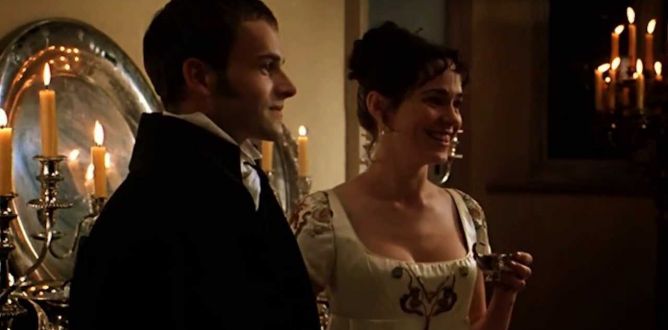Mansfield Park Parent Guide
What differentiates this adaptation from other Austen movies is on-screen sex.
Parent Movie Review
Shy, pious, and modest to a fault, Fanny Price is Jane Austen’s least popular heroine. So when adapting Mansfield Park for the big screen, how does director Patricia Rozema illuminate the main character? Does she provide an exploration of Fanny’s inner life; come up with a way to make her motivations comprehensible to a modern audience? Nope. She takes the easy way out and transforms Fanny (Frances O’Connor) into an assertive young woman who dreams of success as a writer and by doing so, she significantly alters the tone of the story.
Mansfield Park begins with a young Fanny Price (Hannah Taylor Gordon) being sent away from her overcrowded, penurious home in Portsmouth to live with the family of her wealthy aunt and uncle, Sir Thomas and Lady Bertram (Harold Pinter and Lindsay Duncan). As she grows, Fanny is ignored by the eldest son, Tom (James Purefoy), and treated with contemptuous indifference by her cousins, Maria and Julia (Victoria Hamilton and Justine Waddell). Her Aunt Norris (Sheila Gish) is venomously cruel; only her cousin Edmund (Jonny Lee Miller) is kind and welcoming. To escape her subordinate position at Mansfield, Fanny withdraws to her unheated attic bedroom and throws herself into her writing, where she reveals a sly, self-deprecating wit and assertive personality.
The quiet lives of the Mansfield family members are upended when a brother and sister move into the neighborhood. Mary Crawford (Embeth Davidtz) is beautiful, witty, and wealthy, and sets out to captivate Edmund. Her brother Henry (Alessandro Nivola), handsome, debonair, and even wealthier, begins a flirtation with Maria, who is engaged to a mindless fop (Hugh Bonneville). But as Henry spends more time at Mansfield, he begins to appreciate Fanny’s integrity and intelligence and proposes marriage. There’s just one problem: Fanny is in love with someone else.
The story of Mansfield Park doesn’t diverge too far from the narratives of Jane Austen’s other novels. A couple fall in love, an obstacle keeps them apart, and the story plays out through oblique, witty conversations in drawing rooms and balls. Mansfield Park is more staid and less comic than Austen’s earlier works, but it still provides a happy ending for the lovers and just desserts for the unpleasant characters.
What makes Rozema’s adaptation so different from other Austen films is sex. While sexual scandals are often key plot points, Austen keeps all her sex off-screen, so to speak. Characters learn about people’s peccadilloes in correspondence or gossip. But Rozema puts the sex on screen here, filming a graphic adulterous liaison and showing the naked male character on top of the unclothed woman, whose breast is clearly visible. It’s enough to make any Austen afficionado choke on her buttered crumpets.
On a more courageous albeit disturbing note, Rozema also tackles an issue to which Austen only vaguely refers: slavery. Sir Thomas owns a plantation in Antigua, making him a slaveowner. In this adaptation, the issue of slavery causes disquiet to some of the characters and tears apart the relationship between Sir Thomas and his heir, who has drawn disturbing images of slaves being raped, abused, and killed. By turning the spotlight on the dirty little secret underlying so much of England’s wealth, Rozema gives us a more accurate picture of an era usually seen by Austen fans as a time of “bonnets, breeches, and ballrooms”.
Directed by Patricia Rozema. Starring Frances O'Connor, Jonny Lee Miller, Victoria Hamilton, Embeth Davidtz, Alessandro Nivola. Running time: 112 minutes. Theatrical release December 25, 1999. Updated December 10, 2020Watch the trailer for Mansfield Park
Mansfield Park
Rating & Content Info
Why is Mansfield Park rated PG-13? Mansfield Park is rated PG-13 by the MPAA for brief violent images, sexual content and drug use
Violence: We see explicit drawings of slaves being beaten and tortured.Sexual Content: Drawings of a man raping a female slave are seen. There is a brief scene of adultery: the man is on top of the woman whose breast is clearly visible. Men and women kiss. A man comments approvingly on his niece’s figure. A man hugs his daughter and makes her uncomfortable. A woman helps another woman remove her wet dress and underclothes. Men and women rehearsing for a play caress and embrace each other.
Profanity: A couple of terms of deity are used.
Alcohol / Drug Use: A woman is addicted to laudanum (an opiate) and is seen taking her “tonic” regularly. There are scenes of social drinking. A man is so drunk he falls over. A drunken footman leaves a child outside until dawn. A man and woman smoke cigarettes on a few occasions.
Page last updated December 10, 2020
Mansfield Park Parents' Guide
Jane Austen barely addresses the issue of slavery in Mansfield Park, but clues to her opinions are scattered throughout the novel. You can read more about slavery in the novel in these links:
Considering Jane Austen: Austen and Antigua – Slavery in Her Time
Medium.com: The Slave in the Drawing Room
Loved this movie? Try these books…
You can make your own decisions about this film adaptation by reading Austen’s original novel, Mansfield Park. Also by Jane Austen are Pride & Prejudice, Sense & Sensibility, Emma, and Persuasion.
For a speculative look at Austen’s work, and particularly her abolitionist subtext in Mansfield Park, find a copy of Jane Austen, the Secret Radical by Helena Kelly.
Home Video
Related home video titles:
It has been suggested that Jane Austen names her novel after Lord Mansfield, whose legal decision on slavery is at the heart of Belle.
The abolition of slavery in the British Empire was the life’s work of William Wilberforce. His story is told in Amazing Grace.
Other film adaptations of Austen’s novels include Pride & Prejudice, Sense & Sensibility, Love & Friendship, Emma, and 2020’s Emma.

